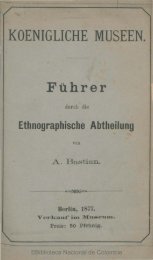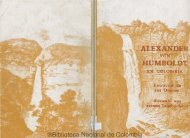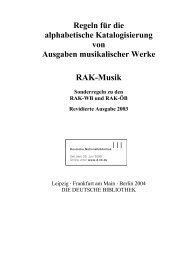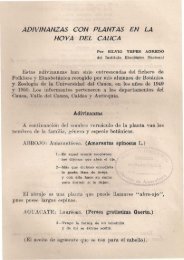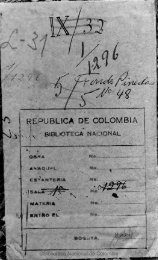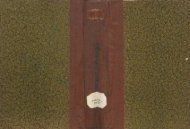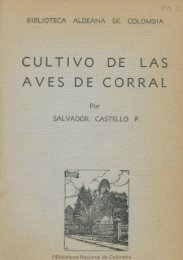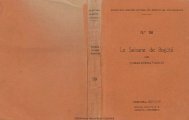You also want an ePaper? Increase the reach of your titles
YUMPU automatically turns print PDFs into web optimized ePapers that Google loves.
<strong>©Biblioteca</strong> <strong>Nacional</strong> <strong>de</strong> <strong>Colombia</strong><br />
BOOK 1. 283<br />
visible. Aeneas thanks Dido for her generosity (579-612). Dido hids<br />
him welcome, sends food to the crews at the ships, nnd or<strong>de</strong>rs a splendid<br />
banquet in the palace (614-642). Aeneas sends for bis son, Ascanius<br />
(643- 656). Venus, substituting Cupid for Ascanius, inflames Queen<br />
Dido with a passionate love for her guest (657-722). The banquet in<br />
Dido's palace. The timo passes in song and talk, till Dido begs Aeneas<br />
to tell the whole story of the fall of Troy and his seven years of wan<strong>de</strong>ring<br />
(699-\'56).<br />
1- 3. Arma - litora. Ioill9 of at'nIO ana the mall, ,"hoft"ot, front the<br />
eaaoto of T,'oy, by fate an exile, cam. to Italy ana the Lavi",'an .ho,·eo.<br />
Italiam and lit or a, terminal accusatives after a verb of motion, the<br />
preposition i71 (which would be inserted in the best prose except before<br />
names of towns) being omitted by poetical usage. H. 379, 4; A. & S.<br />
237, Relu. 5, (c.); B.948.-Fat!l. II. 414; A. & S. 247; B. 873;<br />
A. 54, I. - Profugus. H. 363; A. & S. 204; B. 622; A. 46. - Lavinia,<br />
pronounced La-,Jin.ya. (H. 669, II. 3; A. & S. 306, (3); n. 1519, 3.)<br />
The epithct "Lavin ian" is applied by anticipation to the shores where<br />
the city Lavinium was afterwardB built by Aeneas.<br />
3. lIla, the one; in apposition with qui. - Jactatus and passus are<br />
participles agreeing with ille. - Terris et alto, on lanet auet Oil the<br />
<strong>de</strong>ep; the preposition in, is omitted be foro tbese ablatives of place, hy<br />
& frequent pootieallieense similar to tbat in the omission of tbe preposition<br />
hefore the accusatives in the second and third lines. Terri. is pnrposely<br />
plural, (lit., lalldB,) Aeneas, while seeking a settlement, having<br />
been driven about from country to country.<br />
4. Superum, of the godB; gen. plural for ."peror"",. H. 45, 5, (4);<br />
A. & S. 53; B. 66; A. 10, 6. - Memorem, ever mindful, and therefore<br />
relentless. Well ren<strong>de</strong>red by Conington in his translation of oaeva.<br />
71Jemorem JUllon'is iram, "fell Juno's 'ttnjorgetti,tJg bate."<br />
5, 6. Dum con<strong>de</strong>r et urhem inferretque <strong>de</strong>os Latio, while he was<br />
striving to found a city aud bring (his) gods into Latinm. The i<strong>de</strong>a<br />
of otriv;n9 to found, otriv;"g to bring, is implied in the subjunctivc after<br />
dum. H. 522, II.; A. & S. 263, 4, (1); B. ] 238; A. 62, II. 2. W. mys<br />
"the subjunctive here expresscs ,riBl! and ilwUnation.'· S. gil-es COlt<strong>de</strong>ret<br />
a potcntial force: "till he was able to found." Others tr. "until<br />
he foun<strong>de</strong>d." Sce nofmann on Latin Temporal Particles.<br />
6. Latio, dat., where in prose ill with the aCC. would be used. H. 379,<br />
5; A. & S. 225, IV., Rem. 2; B. 837; A. 51, II. n. - Genus un<strong>de</strong> Latinum,<br />
whence arose the Lati" race. It was tbe tradition that Aeneas<br />
united the AborigineB, whom he found in Italy, with the Trojans, un<strong>de</strong>r<br />
the name" Latins"; that his son Ascanius foun<strong>de</strong>d Alba (" and the<br />
Alban nobles," Alballique patreB); and that from his <strong>de</strong>scendants arose<br />
the principal foun<strong>de</strong>rs of Rome.



